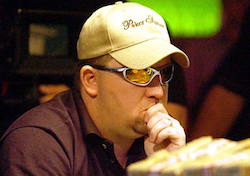This Date in Poker: Chris Moneymaker Wins WSOP Main Event (2003)
 Many in the poker world are noting today how it was 10 years ago — May 23, 2003 — that the final day of the remarkable 2003 World Series of Poker Main Event took place and Chris Moneymaker completed his improbable run to the bracelet and $2.5 million prize.
Many in the poker world are noting today how it was 10 years ago — May 23, 2003 — that the final day of the remarkable 2003 World Series of Poker Main Event took place and Chris Moneymaker completed his improbable run to the bracelet and $2.5 million prize.
The day culminated the five-day tournament that saw a then-record 839 players enter the $10,000 buy-in event. Moneymaker was among of the first wave of players ever to qualify for the WSOP Main Event via an online satellite, in his case representing one of 37 players who won seats and travel packages to Binion’s Horseshoe in Las Vegas that year via PokerStars.
Following several years’ worth of losing at sports betting and other gambling games, the 27-year-old accountant began playing poker both live and online, and in April 2003 entered an 18-player, $39 buy-in sit-n-go tournament on PokerStars apparently without realizing it was not a cash tournament but a satellite with the winner earning a spot in another WSOP Main Event satellite.
After winning the sit-n-go, Moneymaker found himself in the second satellite in which the top three finishers were awarded the $10,000 Main Event entry plus another $1,000 in expenses, with the fourth-place finisher earning $8,000 cash. Moneymaker has explained on several occasions, including most recently in the 2012 documentary All In: The Poker Movie, how after making the final table of the second satellite he began purposely trying to lose chips in an attempt to finish fourth, as the cash prize was much more attractive to him than was the entry to the WSOP Main Event.
Convinced by a friend to go for the ME seat who further promised to buy half of his action should he play, Moneymaker finished in the top three only later to discover his friend was unable to fulfill his promise to give him the $5,000. Ultimately Moneymaker would sell 20% of his action to another friend who like Moneymaker had a weirdly appropriate last name — David Gamble — and thus just a few weeks later made the trip to Las Vegas to play in the Main Event.
Having had only limited live game experience — and, in fact, never having played a live tournament before — Moneymaker traveled to Las Vegas a week ahead of time to play cash games and satellites.
The Main Event began on Monday, May 19, with players starting with 10,000 chips. According to PokerPages’ reporting on the 2003 WSOP Main Event, a total of 385 players survived the first day of play, with Barry Greenstein the end-of-Day-1 chip leader (with 94,775), and the top 10 including Sam Farha (3rd), Tomer Benevenisti (4th), Phil Ivey (6th), and Freddy Deeb (8th). Meanwhile, Moneymaker had managed to accumulate a stack of 60,475 that first day to sit in 11th position.
Day 2 then saw the field trimmed to 111 players, with Amir Vahedi ending the day atop the counts with 303,400, with Bryan Watkins, Scotty Nguyen, Howard Lederer, Freddy Deeb, Phil Ivey, Marcel Luske, Humberto Brenes, James Meehan, and Dutch Boyd rounding out the top 10. Moneymaker ended the day on Tuesday, May 20 in 26th position with a stack of 100,900, still above the average (then a little over 75,000).
On Day 3 the cash bubble burst (at 63 players), with David Chiu (55th, $15,000), Barry Greenstein (49th, $20,000), and Annie Duke (47th, $20,000) among those cashing that day. A total of 45 players survived Day 3, led by Bruno Fitoussi with 671,500 followed by Dutch Boyd (2nd), Scotty Nguyen (3rd), and Phil Hellmuth (4th). Moneymaker ended Day 3 with a stack of 357,000, good enough for 6th among the remaining 45.
The long Day 4 saw them play from 45 players all of the way down to nine. By the dinner break just 22 were left, with Humberto Brenes (41st, $25,000), Jeff Shulman (31st, $35,000), Phil Hellmuth (27th, $45,000), and Men Nguyen (25th, $45,000) among the eliminated. Dutch Boyd had the chip lead then, with Moneymaker still in sixth.
By night’s end they’d reached the final table, the final hand of the night involving Moneymaker dramatically eliminating Phil Ivey in 10th place ($82,700) in a hand that saw Moneymaker flop trip queens (with A-Q), Ivey turn a full house (with 9-9) and get all of his chips in the middle, then Moneymaker spike a four-outer when an ace fell on the river. Others cashing after dinner and prior to Ivey’s exit on Day 4 included Howard Lederer (19th, $45,000), Bruno Fitoussi (15th, $65,000), Marcel Luske ($65,000), Freddy Deeb (13th, $65,000), Dutch Boyd (12th, $80,000), and Minh Nguyen (11th, $80,000).
That hand versus Ivey gave Moneymaker a stack of 2.344 million and the chip lead to start Friday’s final table, with Amir Vahedi the only other player with more than a million (1.407 million) and Sammy Farha next closest with 990,000. Play began in the afternoon, with Moneymaker maintaining the lead as David Singer (9th, $120,000), David Grey (8th, $160,000), and Young Pak (7th, $200,000) were eliminated.
Meanwhile Farha was chipping up, having earned a lot of chips at Amir Vahedi’s expense who subsequently went out in 6th ($250,000). Tomer Benevenisti (5th, $320,000) and Jason Lester (4th, $440,000) followed Vahedi railward, and as they neared 11 p.m. three-handed play began.
Farha and Moneymaker were virtually even to start three-handed play (both at around 3.7 million chips), while Dan Harrington was well behind with just under 1 million. The three would play for two hours more before Moneymaker eliminated Harrington to set up heads-up play with Moneymaker enjoying about a 2-to-1 chip advantage over Farha.
As both Moneymaker and Farha explain in Grantland’s recent oral history of the 2003 WSOP Main Event, the pair discussed the possibility of a deal to divide the remaining prize money, with Moneymaker offering an even split despite having a chip advantage. Farha responded by saying he wanted more than half of the remaining money, and when Moneymaker declined no deal was made.
Heads-up play lasted 28 hands, a little over half an hour not counting the break to discuss a possible chop. The most dramatic hand involved an all-in river shove by Moneymaker with king-high and no pair on a board with three spades, a bluff that successfully forced Farha to fold his top pair of nines.
It was after 1:30 a.m. Vegas time — technically May 24th — when the final hand was dealt, one that saw Farha flop top pair of jacks, Moneymaker flop bottom two pair (fives and fours), and Moneymaker ultimately improving to a full house to win.
By most accounts about 300 witnessed the final table play out that night at Binion’s, and there was immediate evidence that Moneymaker’s victory might earn special notice as the David-versus-Goliath story of the amateur’s victory made national news during subsequent days.
A guest appearance by Moneymaker on “The Late Show With David Letterman” would come in June, but it really wasn’t until ESPN began airing on its coverage of the WSOP Main Event in seven weekly one-hour installments starting on August 26th that the full impact of Moneymaker’s win began to be felt, with the combined influence of online poker, poker on television (with hole cards), and the compelling story of an uncannily-named amateur player’s triumph inspiring countless others to get involved in the game.



















COMMENTS